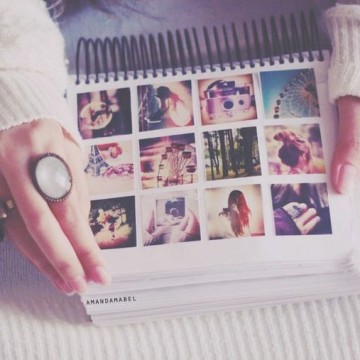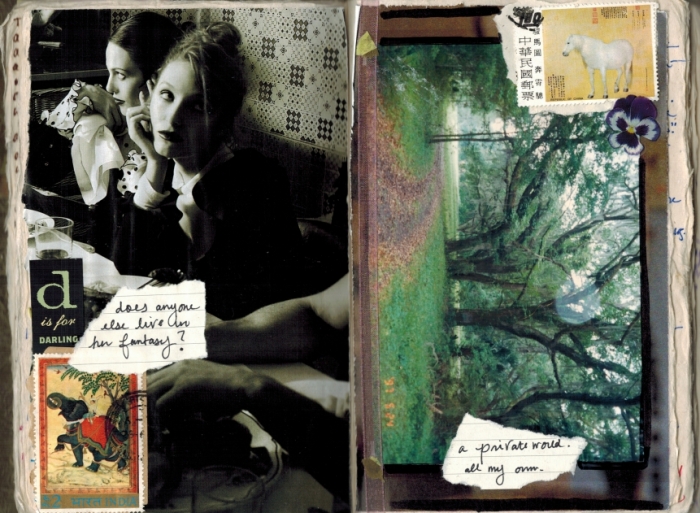Ever the inward-turning youth, elaborate fantasies populated my mental landscape—and often felt more real than “everyday” emotions. In fact, fantasy was my way to temper the ups and downs of adolescent, teenage, and even adult life. No unsavory emotion could fully own me as long as the world behind my eyelids was always available to me.
That’s not to say that I was never caught in dating and friendship drama—because I was. I soaked many a tissue when Mr. So-and-so never called when he said he would. But there was always some safe part of me, detached and observant, certain that something better was out there—if I could imagine it, wasn’t it possible?
Perhaps living a dual life—one in fantasy, one in the “real world”—comes with the territory of being an art-loving and creative soul, if I can fancy myself creative. Perhaps it’s an introvert’s natural defense against the inherently anxiety-inducing social networks of high school and college. Admittedly, fantasy was—and is—as much escape for me as it is anything else.
Of course, the feeling of being at least partially detached from your normal social interactions isn’t entirely blissful. Although I flatter myself and sometimes think “well, because I’m less emotionally involved, I’m more objective/mature/chill,” I have a very difficult time being fully present when I’m around other people when the group is larger than one or two people, and this is something I’ve always had mixed feelings about.
Suffice it to say, I’m in no way arguing that an abundance of fantasy to non-fantasy thoughts is healthy—or that dwelling in a fantasy world doesn’t cause the dweller pain. I simply think there’s a lot to be gained from being aware and inquisitive about our daydreams.
By this point you’re wondering what kind of fantasies filled my head. (Hint: they in no way resembled 50 Shades of Gray.) My daydreams were quite elaborate, often as detailed as a Victorian novel, but never out of this world—sorry to disappoint! Mostly, they were mundane. I’d like to say that I gave myself super powers or even a yacht. But I didn’t. At no point in my imagination did I improve women’s lives with groundbreaking legislation or even find a solution for bacne. Again, sorry.
Rather, I thought about living what I thought was a “normal,” post-college life: working at a vaguely pleasant job, frequenting the farmer’s market, reading one lovely novel after another, and—here’s where things got a little wild—being loved intensely by your average kind-sensitive-intelligent-charming-but-not-too-flirty fellow. Together, we’d live a quietly romantic life, and this was—and is—my biggest, craziest dream.
Hopefully that didn’t put you into a boredom coma. If you’re still awake, we probably have something in common. Even though I often felt like a bozo for having, and then developing, my fantasies, I think many of us of have a version of this that influences our thoughts to varying extremes. Perhaps your daydreams are more glamorous, more politically-informed, or more entrepreneurial. Perhaps “fantasy” means “goal” to you. Perhaps it means “distraction.”
Whatever comprises your wildest dreams, I’m willing to bet there’s something to be learned from them. In a diary I kept my sophomore year at college, I wrote about my vision of a perfect life:
In my room there are several books and candles. Poetry book, diaries, magazines, the pages of which are dimpled with bath water. I have a desk facing the window where I write lots of letters. There’s a little ceramic dish for my lipsticks. I’m married to a man who sits on the porch with a bottle of beer. A man with grin lines. There will be a tire hanging from a tree. There will be errands to run, classes to teach, pasta to boil, coffee to pour, curtains to dust, lingerie to try on, hair to braid. There will be an ocean to perform lullabies.
 As a slightly older version of that dreamer, I know that even the most blissful domestic bliss isn’t so idyllic. Although I consider myself to be happy-in-love with my fiancé, our lives are more struggle-ridden than even my most realistic fantasies could foresee—and really, what’s more “normal” than that?
As a slightly older version of that dreamer, I know that even the most blissful domestic bliss isn’t so idyllic. Although I consider myself to be happy-in-love with my fiancé, our lives are more struggle-ridden than even my most realistic fantasies could foresee—and really, what’s more “normal” than that?
Still, this daydream I recorded years ago reminds me of the things I still seek to prioritize: writing, reading literature, relishing everyday activities (and even routine), and, of course, being “at home” with the person I love.
It also (re)teaches me a very important thing about myself: I love and need privacy and moments I share with just myself. (Never mind that I just shared an excerpt of my diary with strangers on the internet. But hey, Peaceful Dumpling readers are special!)
I often find myself feeling apologetic for this vision and my need for time to work on things (like journals) that no one else may ever see. Also, on top of feeling I should fantasize less, I also feel the pressure to dream bigger—shouldn’t I find some larger cause than my own happiness? (And shouldn’t it be something I can tweet about?)
Well, here’s where I think fantasy plays a neat role—the dream I described above is a template, a foundation of sorts. A life that parallels that idea allows me to be more useful to the world. When our emotional and creative needs are met, we’re in the best place to discover how to turn what brings us joy into something outwardly driven.
It’s true: I am most energetic when my allow myself the downtime for reading poetry in the bath—and I know I’m most in tune when I enjoy every step of preparing the morning’s coffee. Blogging to thousands of readers was never a detail in my fantasies, yet I feel it’s an organic extension of a life focused on cherishing the small (big) things and creatively expressing love for them.
Unfortunately, I forget this when I compare myself to others, my dreams to theirs, the way I dream to the way they dream. If you ever want to feel bummed and unmoored from your internal compass, give this a shot. Trying to apply another person’s idea of success to your dreams diminishes what is uniquely you—and that’s no way to serve the world—or yourself!
Rather, honor your fantasy. Sit with it. What does it teach you about you? And no, it doesn’t matter if any of it’s tweetable.
Also see: Dream Catcher – Tapping the Unconscious for Health and Creativity
Using Crystals for Daily Inspiration
Creative Life: 5 Ways to Stay Inspired
Photo: Mary Hood, Amanda Mabel via Flickr


